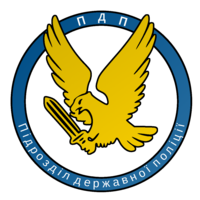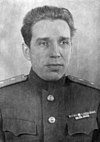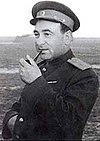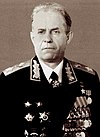PDP
| Підрозділ державної поліції (ПДП) Pidrozdil derzhavnoyi politsiyi (PDP) | |
 | |
| Agency overview | |
|---|---|
| Formed | April 13, 1931 |
| Jurisdiction | State Assembly and Presidency |
| Headquarters | Latantsy Street, Samistopol, Soravia |
| Motto | "Peace through strength" "Мир через силу" |
| Employees | Undisclosed, est. 20–30,000 |
| Annual budget | Undisclosed, est. €10 billion |
| Minister responsible | |
| Agency executive | |
| Website | pdp |
The State Police Unit (Soravian: Підрозділ державної поліції; Pidrozdil derzhavnoyi politsiyi), better known by its Soravian abbreviation PDP is the principal secret police organisation of the Soravian Republic, acting as its main security agency and conducting both domestic and foreign intelligence gathering. The PDP is one of Euclea's most active secret police organisations and holds significant influence within Soravia, and has historically been extremely active in much of central Euclea, particularly in the fallout of the Sostava War.
The PDP was founded in 1931 as an undercover intelligence group operating behind enemy lines in Poliania and Gaullica during the Great War. Successful through its use of espionage and undercover double agents, the PDP was expanded to become Soravia's primary secret police organisation by Vladislav Pudovkin in 1941, and also participated in the Solarian War against Etruria in the mid-1940s. It was expanded greatly by Gabriel Tozulyak in the 1960s at the height of the Great Game and was extremely active in nations such as Equalist Amathia and Slirnia. During the Sostava War, much of the PDP mutinied to the Partisans, and the organisation continued its work throughout the war, especially in Zalykia. The organisation was again incredibly active in central Euclea after the war, contributing greatly to retention of Soravian influence in the area.
As one of Euclea's largest intelligence agencies, with an estimated number of personnel of up to 30,000 and an estimated budget of around €10 billion, the PDP continues to maintain an global network of underground resources that are frequently used by Soravia for foreign intelligence and domestic security purposes.
History
Great War (1931–35)
The PDP was founded as Division Nine (Дивізіон 9; Dyvizion 9) in 1931 to carry out espionage missions centralised under one organisation. Pudovkin, a firm believer in discipline and top-down organisation, was a primary backer of the centralisation of sabotage and espionage missions, which had prior been completed independently of central command by generals and leaders of other armies and divisions. Division Nine's main goal was to secure information regarding Polianian positions, times of attacks, paths and other useful information partaining to sieges of important cities as Soravia looked to push Poliania to surrender with its counter-offensive. They were successful in collecting and examining classified information at Pripek in late 1931 and successfully intercepted and decoded radio messages for over five months unknown to the Polianians between 1931 and 1932. After the Siege of Pripek concluded in June 1932, Vladimir Hutnyan, the Commander of the Soravian armies in Poliania, said:
The city broke resistance at 0930 hours, June 18, 1932. Give my utmost respect to the men of the Ninth Division, without their work, this victory would not be reality.
— Vladimir Hutnyan, 18 June 1932 (declassified in 1951)
The PDP continued their operations through Poliania, assisting in information gathering in cities across the country and allowing Soravia to plan its movements. Poliania became suspicious of Soravian intelligence and switched their radio coding systems in 1933, although the code was cracked again by Division Nine a few months later. After Poliania began to suffer heavy losses, the PDP (renamed in early 1934) began to branch out into other fronts of the war. With personnel being redirected to the eastern front as Poliania fell and Kirenia entered the war on the side of the Grand Alliance, the PDP saw increasing activity undercover in Gaullica towards the end of the war, where they served mainly to intercept intelligence regarding Gaullican air raids and army positions. Most PDP agents were removed from wartime countries when the war concluded in 1935, but the PDP maintained an expansive overseas network of agents for post-war information collection, particularly as Gaullica began its alignment with the Nations of Euclea and the Great Game begun.
Interwar period (1935–43)
Solarian War (1943–46)
Great Game (1946–83)
Sostava War (1979–83)
After the Sostava War (1983–90)
Modern history (1990–)
Structure and organisation
Domestic operations
Suppression of internal dissent
One of the PDP's more notorious operations was the internal suppression of political dissent. Particularly during the Great Game, the PDP oversaw a number of high-profile kidnappings, disappearances, and assassinations. Most of the PDP's resources pertaining to internal suppression were directed at the rising socialist movement following the Great War, and the organisation was highly active in socialist Euclea. Some of the PDP's earliest operations involved intelligence-collecting and espionage on the Voyins movement in eastern Soravia and Velzemia. In 1932, the PDP attempted to assassinate Vichod revolutionary Saku Litmanen in Operation Red Tide, however the operation failed and Litmanen successfully fled to Swetania. Persecution of socialism would pick up in the 1940s and especially during the later years of the tenure of Vladislav Pudovkin, whose staunch anti-socialist policies formed much of the PDP's ideological modus operandi.

The PDP was also tasked with the suppression of independence movements in Central Euclea, playing a large role in the administration of Central Euclea by making it obvious the punishment for dissident thought in Soravia's Central Euclean states. The PDP has largely halted these operations by the time Gabriel Tozulyak came to power and relations with Central Euclea began a slow mend. The PDP maintained a number of non-Soravian agents from many countries throughout Central Euclea, who were particularly useful for operations in Amathia and Slirnia, countries where the PDP maintained well-connected intelligence networks and links to the mainland. Vilem Gardos attempted to restore the PDP's vast operations in Central Euclea, but came at odds with then-Chief of Staff Ruslan Yurchenko, who refused to authorise the move. Gardos and Yurchenko eventually compromised, the PDP continued to avoid mass suppression of Central Euclean nations, however it began the start of the splinter between the Presidency and the PDP over internal matters.
After the Sostava War, the PDP's internal suppression was scaled back, particularly during the administration of Vasil Bodnar, who reduced the PDP's funding and pushed legislation that eventually saw the PDP become accountable to the Federal Assembly, including both the Voynaskul and Duma. Ivan Lecsko restored PDP operations in suppression internal dissent, which continued to extent towards Soravia's left-wing and socialist movement, but also extended beyond and grew particularly repressive during the 1990s, where the Patriots' Front of Soravia reached its height in domestic power. In the modern day, the PDP reportedly continues to suppress these political movements, although to a lesser extent than in the 20th century. The PDP is also still known for its operations regarding governmental critics, defected agents and enemies of the state, as well as Soravian journalists living abroad who attempt to provide insight on the inner works of the government.
Zalykia
International operations
Assassination of Vilem Gardos
On March 19, 1986, former Soravian president Vilem Gardos was declared dead in the city hospital of Bandar-e Inqelab in Zorasan. Gardos had been exiled in Zorasan since he was granted asylum by the county in 1982 after his loss in the Sostava War. Reportedly, he was granted a house on a coast by the Zorasani government, and was initially heavily guarded by both Gardos' personal guard, six of whom had flown over from Soravia, as well as a small group of soldiers from the Zorasani Irfanic Revolutionary Army. Beginning in late 1983, the guard on the house was lessened and Gardos began making increased public appearances, masquerading his identity with facial hair that had been dyed black. Reportedly Gardos had been using the alias of Nouzar Abbasi, and had been a Zorasani citizen since 1983. The Zorasani Army ceased guarding the property sometime in 1985 and Gardos was left with two night guard on the property for most days.
As Gardos made his way into Bandar-e Inqelab, presumably for grocery shopping and later seen visiting a bank, he was shot in the arm from a short distance with a modified umbrella, containing a mechanism used to propel an engineered pellet containing ricin. Later developing a fever and later severe vomiting and diarrhoea symptoms, Gardos was admitted to hospital on the evening of March 17. Preliminary tests by Zorasani doctors did not rule out the possibility of external poisoning but did not confirm it until Gardos died on March 19, by which it was discovered that he had around 60 micrograms of ricin per kilogram body weight in his body, almost three times the median lethal dose. Gardos was confirmed dead by Zorasani medical officials a day later, by which is it speculated the perpetrating agent had flown back to Soravia. It was the first high-level assassination carried out by the PDP after the Sostava War and one of the few conducted outside of Euclea. Diplomatic exchanges between Soravia and Zorasan after the incident led to the eventual degradation of bilateral relations between the countries, and hampered Soravia's ties with ROSPO.
Buildings
Chief of Staff
| No. | Name | Portrait | Years served | President(s) |
|---|---|---|---|---|
| 1 | Andrei Glinin (1887–1955) |
 |
April 13, 1931 – June 5, 1941 |
Vladislav Pudovkin |
| 2' | Rodion Gusin (1891–1970) |
 |
June 5, 1941 – February 9, 1949 |
Vladislav Pudovkin |
| 3 | Tselya Vanko (1905–1981) |
 |
February 9, 1949 – November 1, 1952 |
Vladislav Pudovkin |
| 4 | Oleksii Dobrovolsky (1909–1974) |
 |
November 1, 1952 – February 4, 1971 |
Vladislav Pudovkin Gabriel Tozulyak |
| 5 | Ladzimir Anachenko (1930–1999) |
 |
February 4, 1971 – August 27, 1973 |
Gabriel Tozulyak Vilem Gardos |
| 6 | Ruslan Yurchenko (1928–2009) |
 |
August 27, 1973 – March 6, 1974 |
Vilem Gardos |
| 7 | Teimurazi Donauri (1933–1989) |
 |
March 6, 1974 – September 10, 1977 |
Vilem Gardos |
| 8 | Khatsiarelli Savinkov (1932–2011) |
 |
September 10, 1977 – May 29, 2000 |
Vilem Gardos Sava Tokar Vasil Bodnar Ivan Lecsko Samuel Czenko |
| 9 | Taras Surnin (1961–) |
 |
May 29, 2000 – July 7, 2009 |
Samuel Czenko Mergen Baynev |
| 10 | Vsevolod Karnakhov (1955–) |
 |
July 7, 2009 – present |
Mergen Baynev Samuel Czenko Valentina Goga |